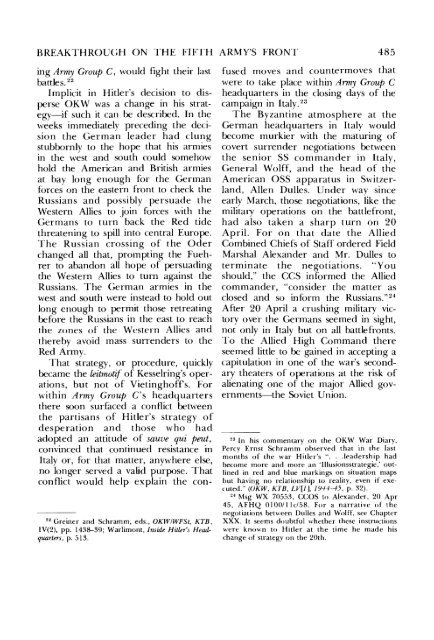Cassino to the Alps - US Army Center Of Military History
Cassino to the Alps - US Army Center Of Military History
Cassino to the Alps - US Army Center Of Military History
You also want an ePaper? Increase the reach of your titles
YUMPU automatically turns print PDFs into web optimized ePapers that Google loves.
BREAKfHROUGH ON THE FIFcT'H ARMY'S FRON'I' 485<br />
ing <strong>Army</strong> Group C, would fight <strong>the</strong>ir last<br />
battles, 22<br />
Implicit in Hitler's decision <strong>to</strong> disperse<br />
OKW was a change in his strategy-if<br />
such it can be described. In <strong>the</strong><br />
weeks immediately preceding <strong>the</strong> decision<br />
<strong>the</strong> German leader had clung<br />
stubbornly <strong>to</strong> <strong>the</strong> hope that his armies<br />
in <strong>the</strong> west and south could somehow<br />
hold <strong>the</strong> American and British armies<br />
at bay long enough for <strong>the</strong> German<br />
forces on <strong>the</strong> eastern front <strong>to</strong> check <strong>the</strong><br />
Russians and possibly persuade <strong>the</strong><br />
Western Allies <strong>to</strong> join forces with <strong>the</strong><br />
Germans <strong>to</strong> turn back <strong>the</strong> Red tide<br />
threatening <strong>to</strong> spill in<strong>to</strong> central Europe.<br />
The Russian crossing of <strong>the</strong> Oder<br />
changed all that, prompting <strong>the</strong> Fuehrer<br />
<strong>to</strong> abandon all hope of persuading<br />
<strong>the</strong> Western Allies <strong>to</strong> turn against <strong>the</strong><br />
Russians. The German armies in <strong>the</strong><br />
west and south were instead <strong>to</strong> hold out<br />
long enough <strong>to</strong> permit those retreating<br />
before <strong>the</strong> Russians in <strong>the</strong> east <strong>to</strong> reach<br />
<strong>the</strong> zones of <strong>the</strong> Western Allies and<br />
<strong>the</strong>reby avoid mass surrenders <strong>to</strong> <strong>the</strong><br />
Red <strong>Army</strong>.<br />
That strategy, or procedure, quickly<br />
became <strong>the</strong> leitmotif of Kesselring's operations,<br />
but not of Vietinghoffs. For<br />
within <strong>Army</strong> Group C's headquarters<br />
<strong>the</strong>re soon surfaced a conflict between<br />
<strong>the</strong> partisans of Hitler's strategy of<br />
desperation and those who had<br />
adopted an attitude of sauve qui peut,<br />
convinced that continued resistance in<br />
Italy or, for that matter, anywhere else,<br />
no longer served a valid purpose. That<br />
conflict would help explain <strong>the</strong> con-<br />
2' Greiner and Schramm, eds., OKWIWFSt, KTB,<br />
IV(2), pp. 1438-39; Warlimont, Inside Hitler's Headquarters,<br />
p. 513.<br />
fused moves and countermoves that<br />
were <strong>to</strong> take place within <strong>Army</strong> Group C<br />
headquarters in <strong>the</strong> dosing days of <strong>the</strong><br />
campaign in Italy. 23<br />
The Byzantine atmosphere at <strong>the</strong><br />
German headquarters in Italy would<br />
become murkier with <strong>the</strong> maturing of<br />
covert surrender negotiations between<br />
<strong>the</strong> senior SS commander in Italy,<br />
General Wolff, and <strong>the</strong> head of <strong>the</strong><br />
American OSS apparatus in Switzerland,<br />
Allen Dulles. Under way since<br />
early March, those negotiations, like <strong>the</strong><br />
military operations on <strong>the</strong> battlefront,<br />
had also taken a sharp turn on 20<br />
April. For on that date <strong>the</strong> Allied<br />
Combined Chiefs of Staff ordered Field<br />
Marshal Alexander and Mr. Dulles <strong>to</strong><br />
terminate <strong>the</strong> negotiations. "You<br />
should," <strong>the</strong> CCS informed <strong>the</strong> Allied<br />
commander, "consider <strong>the</strong> matter as<br />
dosed and so inform <strong>the</strong> Russians."24<br />
After 20 April a crushing military vic<strong>to</strong>ry<br />
over <strong>the</strong> Germans seemed in sight,<br />
not only in Italy but on all battlefronts.<br />
To <strong>the</strong> Allied High Command <strong>the</strong>re<br />
seemed little <strong>to</strong> be gained in accepting a<br />
capitulation in one of <strong>the</strong> war's secondary<br />
<strong>the</strong>aters of operations at <strong>the</strong> risk of<br />
alienating one of <strong>the</strong> major Allied governments-<strong>the</strong><br />
Soviet Union.<br />
23 In his commentary on <strong>the</strong> OKW War Diary,<br />
Percy Ernst Schramm observed that in <strong>the</strong> last<br />
mon'ths of <strong>the</strong> war Hitler's H •• .leadership had<br />
become more and more an 'Illusionsstrategie: outlined<br />
in red and blue markings on situation maps<br />
but having no relationship <strong>to</strong> reality, even if executed."<br />
(OKW, KTB, LV[I], 1944-45, p. 32j.<br />
24 Msg WX 70553, CCOS <strong>to</strong> Alexander. 20 Apr<br />
45, AFHQ OIOO/llcl58. For a narrative of <strong>the</strong><br />
negotiations between Dulles and Wolff, see Chapter<br />
XXX. It seems doubtful whe<strong>the</strong>r <strong>the</strong>se instructions<br />
were known <strong>to</strong> Hitler at <strong>the</strong> time he made his<br />
change of strategy on <strong>the</strong> 20th.
















